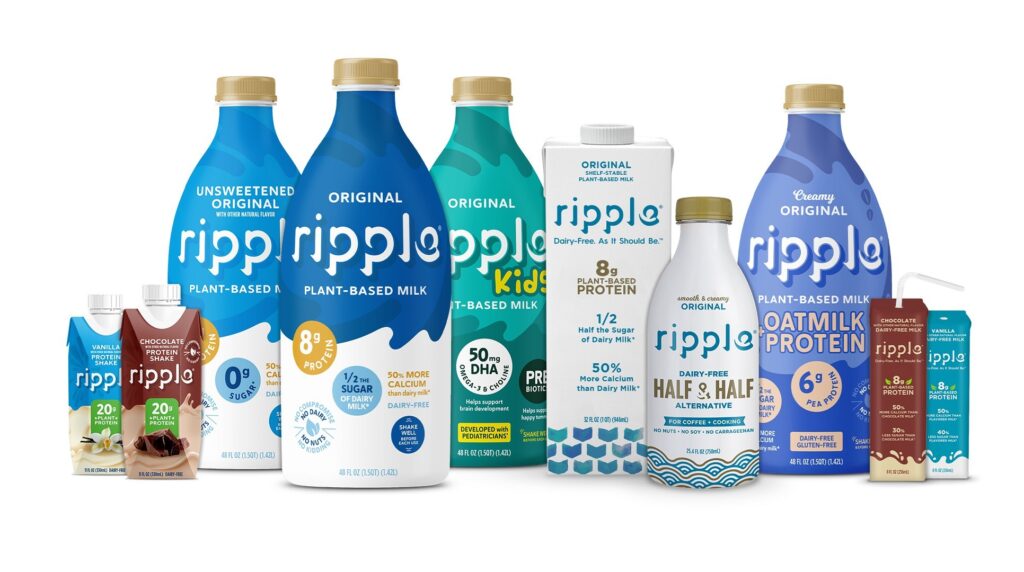Ripple pea milk, a leading US plant-based milk brand, recently raised a substantial $49.2 million in its latest funding round, elevating the company’s total investments to a staggering $274 million. This financial boost coincides with a growing interest in the pea milk category, which has recently overshadowed the broader alt-dairy sector in year-on-year growth.
As per an SEC filing, the California-based company’s funding comprised equity, debt and securities, totaling a $55.4 million offering, convertible through future options or warrants. This funding trail was previously bolstered by a $60 million Series E round in 2021, led by S2G Ventures, Bloom8 and Ajax Strategies, with other backers like TAO Capital, Siddhi Capital, Prelude Ventures, Khosla Ventures and GroundForce Capital.
How Ripple Is Paving the Way for Pea Milk
Ripple pea milk, renowned in the plant-based milk industry, was initiated in 2014 by Adam Lowry and Neil Renninger. Currently, it’s led by CEO Laura Flanagan, marking a rare instance of significant venture capital (VC) investment in a woman-led enterprise. Ripple pea milk stands out for its yellow pea-based milk and protein shakes.
Related: Mooala Introduces Shelf-Stable Line of Organic Plant-Based Milks
While several companies produce milk from yellow peas, Ripple distinguishes itself by employing innovative technology. This technology effectively removes undesirable elements like color and flavor from standard plant protein isolates. The result is “Ripptein,” a uniquely neutral-tasting protein suitable for high-quantity inclusion in both food and beverages.
Ripple successfully addressed taste and texture challenges, enabling the company to increase protein content to eight grams per eight-ounce serving while reducing sugar to six grams per serving. This development has led to the creation of a plant-based milk that is free from common allergens such as soy, dairy and nuts. Compared to two percent dairy milk, Ripple’s product boasts half the sugar content and 50 percent more calcium. Additionally, it offers eight times the protein of almond milk.
Since its launch in early 2016, the Ripple pea milk brand has expanded its presence in grocery stores across the US. The product line has grown to include protein shakes, children’s products and half-and-half. However, not all of Ripple’s ventures have been successful, with its plant-based yogurt and superfood milks not achieving the same level of market success.
Although Ripple has not released a statement on the latest funding, Flanagan had previously emphasized the company’s tripling growth rate compared to the overall plant-based milk industry. The new capital aims to fuel product innovation, market expansion and further the brand’s global footprint, aligning with its mission to offer sustainable, plant-based foods.
American Pea Milk Market
In the US, Ripple Pea Milk’s fundraising arrives during a pivotal time for plant-based milk. The sector witnessed a nine percent growth in 2022, securing a 15.4 percent share of the total milk market. Although unit sales dipped slightly, Ripple pea milk remained a top contender, with the pea milk category itself growing by over 27 percent annually.
Despite recent market fluctuations, Ripple pea milk and the pea milk segment have outperformed both conventional and overall plant-based dairy sectors in the past year. This trend is supported by shifting consumer preferences towards health, with Ripple offering a soy- and nut-free alternative, rich in calcium and protein.
Ripple pea milk is currently available in over 20,000 retail locations. Although it faces competition from brands including Bolthouse Farms, Swedish Sproud and NotCo, which also focuses on yellow pea protein in its products, Ripple has undoubtedly become synonymous with pea milk in the American market.












Join or login to leave a comment
JOIN LOGIN